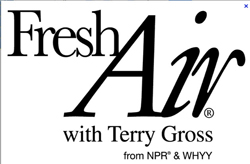Fresh Air, the Peabody Award-winning broadcast, is one of NPR’S most popular programs. I’ve been a fan of the podcasts and it’s host Terry Gross for years.I highly recommend it.
 Fresh Air with Terry Gross, the Peabody Award-winning weekday magazine of contemporary arts and issues, is one of public radio’s most popular programs. Each week, nearly 4.5 million people listen to the show’s intimate conversations broadcast on more than 450 National Public Radio (NPR) stations across the country, as well as in Europe on the World Radio Network.
Fresh Air with Terry Gross, the Peabody Award-winning weekday magazine of contemporary arts and issues, is one of public radio’s most popular programs. Each week, nearly 4.5 million people listen to the show’s intimate conversations broadcast on more than 450 National Public Radio (NPR) stations across the country, as well as in Europe on the World Radio Network.
Fresh Air podcast episode – Chris Rock interview
[audio:https://gregorymancuso.com/wp-content/uploads/2012/08/01-Chris-Rock-On-The-Funny-Business2-edit.mp3]
Though Fresh Air has been categorized as a “talk show,” it hardly fits the mold. Its Peabody Award citation credits Fresh Air with “probing questions, revelatory interviews and unusual insights.” And a variety of top publications count Gross among the country’s leading interviewers. The show gives interviews as much time as needed, and complements them with comments from well-known critics & commentators.
Terry Gross
Combine an intelligent interviewer with a roster of guests that, according to the Chicago Tribune, would be prized by any talk-show host, and you’re bound to get an interesting conversation. Fresh Air interviews, though, are in a category by themselves, distinguished by the unique approach of host and executive producer Terry Gross. “A remarkable blend of empathy and warmth, genuine curiosity and sharp intelligence,” says the San Francisco Chronicle.
Gross, who has been host of Fresh Air since 1975, when it was broadcast only in greater Philadelphia, isn’t afraid to ask tough questions. But Gross sets an atmosphere in which her guests volunteer the answers rather than surrendering them. What often puts those guests at ease is Gross’ understanding of their work. “Anyone who agrees to be interviewed must decide where to draw the line between what is public and what is private,” Gross says. “But the line can shift, depending on who is asking the questions. What puts someone on guard isn’t necessarily the fear of being ‘found out.’ It sometimes is just the fear of being misunderstood.”
